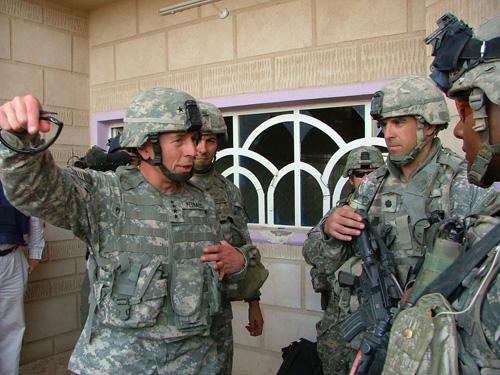Bush: Iraqi officials struggle; Legislators vote to withdraw

Gen. David Petraeus, left, the top U.S. commander in Iraq, meets his field commanders in Baqouba on Saturday. Sunni extremists are likely to try a series of attacks to grab headlines, Petraeus said. Robert H. Reid, The Associated Press
July 13, 2007
WASHINGTON – The Iraqi government is achieving only spotty military and political progress, the Bush administration conceded Thursday in an assessment that war critics quickly seized on as confirmation of their dire warnings. Within hours, the House voted to withdraw U.S. troops by spring.
The House measure passed 223-201 in the Democratic-controlled chamber despite a veto threat from President Bush, who has ruled out any change in war policy before September.
“The security situation in Iraq remains complex and extremely challenging,” the administration report concluded.
“I believe we can succeed in Iraq, and I know we must,” Bush said at a White House news conference at which he stressed the interim nature of the report.
Describing a document produced by his administration at Congress’ insistence, he said there was satisfactory progress by the Iraqi government toward meeting eight of 18 so-called benchmarks, unsatisfactory progress on eight more and mixed results on the others.
Get The Daily Illini in your inbox!
To his critics – including an increasing number of Republicans – Bush said, “I don’t think Congress ought to be running the war. I think they ought to be funding the troops.”
Bush announced last winter he was ordering thousands of additional troops to the war zone, but the full complement has only arrived in recent weeks.
“The full surge in this respect has only just begun,” the report said.
In other areas, Bush added, they “have much more work to do. For example, they’ve not done enough to prepare for local elections or pass a law to share oil revenues.”
While Iraq has begun to show progress in providing services, “citizens nationwide complain about government corruption and the lack of essential services, such as electricity, fuel supply, sewer, water, health and sanitation.”
At another point, it added, “The prerequisites for a successful militia disarmament program are not present.”
In addition to citing a Syrian connection for terrorists, it also said Iran has continued to foster instability in Iraq.
The report also said progress toward political reconciliation was hampered by “increasing concern among Iraqi political leaders that the United States may not have a long term-commitment to Iraq.”
Despite rising pressure from Republicans in Congress for a change in course, Bush was adamant.
But Sen. Mitch McConnell of Kentucky, the Republican leader, said Congress has already decided it will be September before the administration’s strategy can be evaluated properly. “Certainly the young soldiers and Marines risking their lives today on the streets of Baghdad and Ramadi would agree – and they deserve our patience.”






